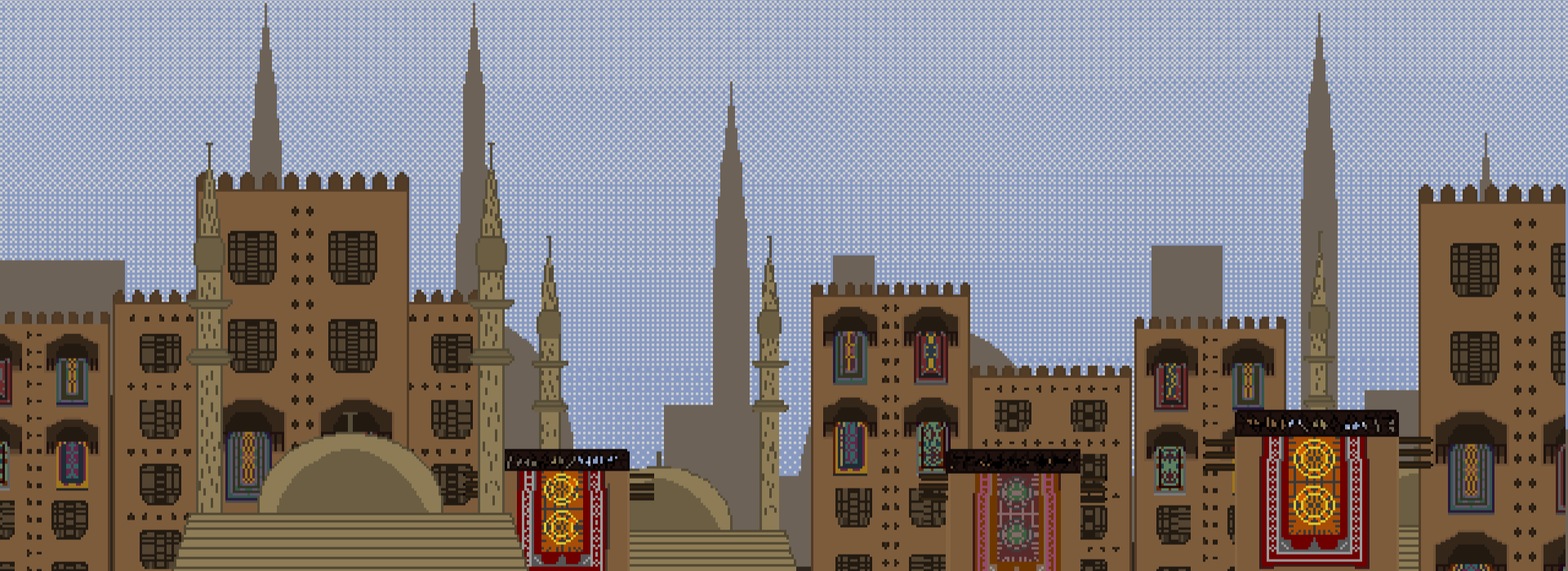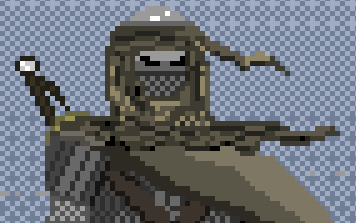Gameplay & Mechanics
Game loops:
- Meta game loop: Upgrading skill trees, purchasing items and resources that are used in the core game loop, and story progression.
- Core game loop: Going through platforming challenges and fighting enemies. Collecting gold to be used for purchasing items and aura used for abilities, from either dead enemies or from chests. Each level ends with a boss fight that rewards the player with an upgrade point that may be used in their skill trees.
Combat
- Swift-paced combat, different combat moves may be chained together to create player-made combos, similar to a fighting game.
- Many different skills may be learned over the course of the game.
- Magic, Piety, and Humanity skill trees may each unlock differing abilities that impact the options the player has in approaching combat & platforming scenarios.
Baseline combat mechanics:
- Dash-Dodge
- Stamina is used for dodging. There are up to three dashes available at a time, but they refill after a certain amount of seconds pass.
- The amount of time it takes to refill can be reduced with permanent upgrades.
- The amount of available dodges can be increased with temporary effects (such as spells or specific potions)
- Stamina is used for dodging. There are up to three dashes available at a time, but they refill after a certain amount of seconds pass.
- Counter (deflects certain attacks)
- Normal attacks (will be a three hit combo, right slash, left slash, and a final middle slash)
- Item use (i.e. throwing knives, fire bombs, etc.)
- Healing (base healing system is water from ancient springs)
- There are three heals available at a time that are replenished at checkpoints within the level.
- More heals may be ascertained via purchasing healing items, picking items off dead enemies, or using a skill from one of the eruditions.
- There are three heals available at a time that are replenished at checkpoints within the level.
- Ability Meter
- This is an energy bar that depletes each time an ability (action skill/spell/prayer) is used. The amount it depletes is dictated by the ability used (i.e. more powerful abilities depletes it faster).
- It may be replenished by killing enemies, picking up aura that replenishes it, or getting to checkpoints.
- This is an energy bar that depletes each time an ability (action skill/spell/prayer) is used. The amount it depletes is dictated by the ability used (i.e. more powerful abilities depletes it faster).

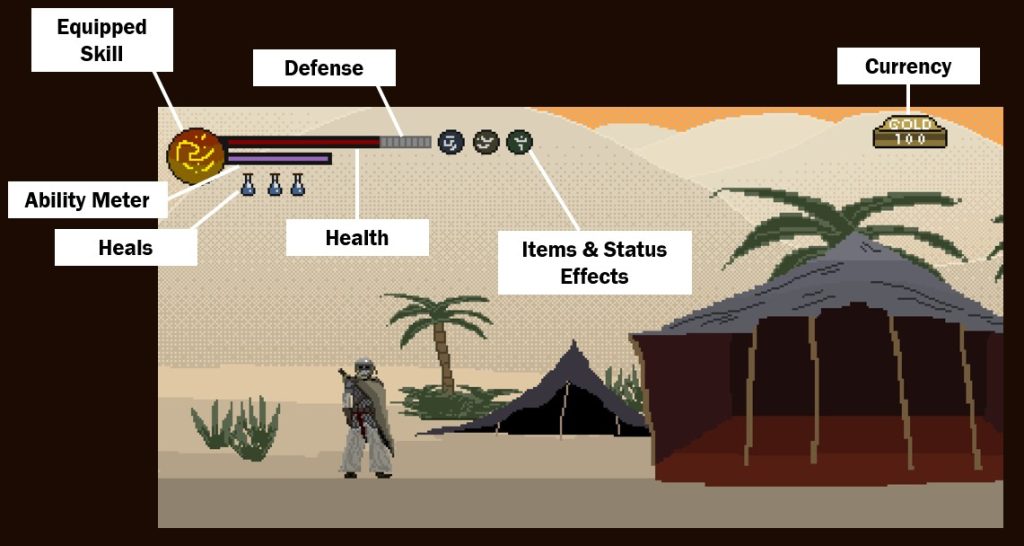
Enemies:
Combat:
- Different enemies have different attacks that should be dodged differently.
- Some enemies may deflect the player’s attacks and need to be defeated using acquired skills, specific items, or being attacked at certain weak points.
- One on one Combat doesn’t last more than a few seconds.
- Group enemies as well as enemies intertwined with platforming challenges may take longer to defeat, the length of this is determined by how the designers have arranged the enemies and platforming challenges.
Incentive:
- Enemies drop gold & aura.
- Gold may be used for purchasing items at NPC shops and upgrading abilities.
- Aura helps replenish the ability meter.
- Not every enemy drops the same amount of gold or aura. The amount of gold and aura dropped is determined by how challenging a given enemy is.
Boss fights:
- Range from gimmick fights to proper one-on-one duels. Last between 30 seconds to several minutes, depending on the fight; the tutorial boss for instance should be relatively easy and take a minute or less for new players to understand, versus the final boss which should test the players’ skills and take several minutes.
Stats
- The Mercenary will have a base HP, a base recharge rate of his dodges, a base defense stat, a base ability meter, and a base movement speed.
- Most of the base stats in the game cannot be changed permanently and instead may be enhanced using consumables or spells/prayers.
- As the game progresses there are compulsory upgrades to the base health/stamina/ability meter of the player. At the end of each level, before the Mercenary makes camp, he decides to search for a nearby spring and the type of spring he looks for is decided by the player. The two types of springs are either enduring springs or vitality springs.
- Enduring springs increase the speed at which dodge-dashes are recharged.
- Vitality springs increase the overall health of the Mercenary.
- These can be further upgraded by finding optional secret springs in each level.
- The Ability meter is upgraded every other level by the Ally of the Mercenary (either using a spell or a prayer depending on which Ally the player has chosen).
- It can be further upgraded by finding hidden incantations/prayers in secret areas within every other level.
Non-Comprehensive Enemy stat sheet:
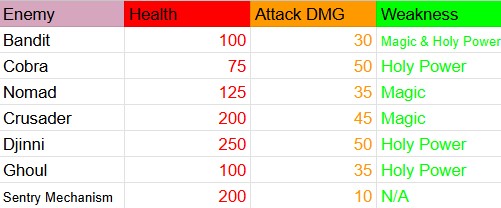
This stat sheet is a concept of the qualities of certain enemies. It gives a general example of these enemies’ powers and weaknesses. For instance, a Djinni may be designed to be a powerful enemy while a Ghoul may be a weaker, more common enemy type. It is at the game designers’ discretion of how much they wish to utilize this stat sheet (if at all).
Platforming
- Relies on quick thinking and understanding of the movement controls of the game.
- The mechanics of platforming are as follows:
- Walking/running
- Jumping
- Crouching
- Dashing
- Wall jumps/slides.
- Some sections require more methodical and thoughtful approaches from the player while other sections require quick and decisive action.
- New skills may be learned to assist in platforming or unlock new sections.
The first sequence gives the player all the basic skills they need to complete the game, beyond that, it is at the player’s discretion what they choose to learn, and that may affect how certain platforming challenges are solved and what levels/secrets they may discover or miss.
- Magic, Piety, and Physical skill trees may each unlock differing skills that impact the gameplay in different ways.
Union of Platforming & Combat
Platforming and combat will be intertwined with one another. Skills the player has may be used for both.
- Few skills are applicable to only one or the other (platforming or combat), they will have a complete unification.
- The skills the player learns and the items they may acquire can be used for both platforming and combat. Here are some examples:
- Dodge-dashes are quick movements that cover a fair bit of distance while giving temporary invincibility to the mercenary during a few frames of the animation. They may be used for platforming and in combat. In regards to combat, it may be used for making space and dodging enemy attacks. For platforming it may be used for crossing certain obstacles and reaching far platforms
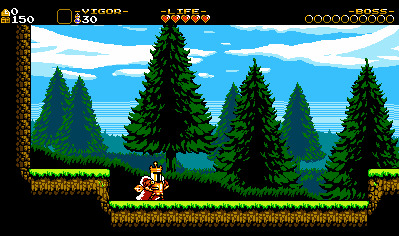
- Overhead swings are jump/air attacks where the mercenary swings his blade over his head downwards. They can be used to inflict powerful attacks on enemies but they can also be used to increase the ledge-grab distance so the player can “hook” their sword on a ledge slightly out of reach. (Inspired by Tahtib)
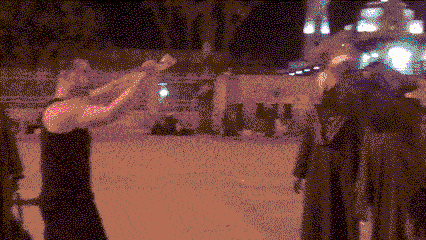
Skill Trees
There are 3 skill trees:
The Erudition of Piety: pertaining to holy matters utilizing the powers of God through invoking his name, reciting scripture, and praying
The Erudition of Magic: pertaining to metaphysical matters utilizing forbidden knowledge, invoking spirits, and using the occult sciences
The Erudition of Humanity: pertaining to corporeal matters such as martial arts and basic non-supernatural skills
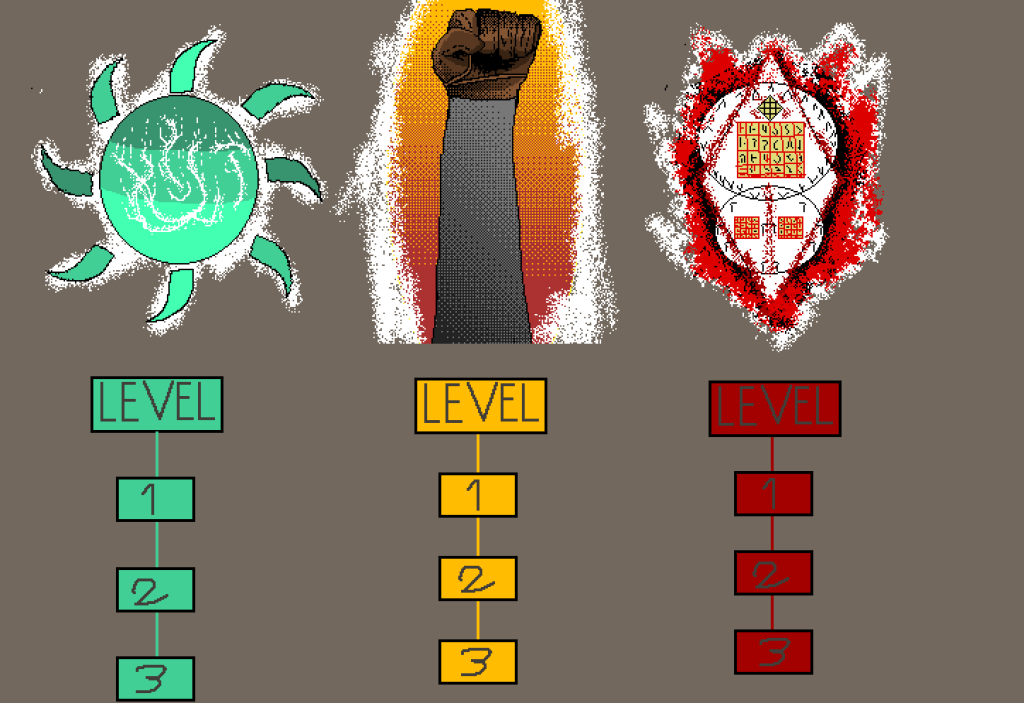
Before going further the baseline skills should be recalled:
- Jump
- Dash-Dodge
- Normal attacks (will be a three hit combo, right slash, left slash, and a final middle slash)
- Wall climb/slide
- Item use (i.e. throwing knives, molotovs, etc.)
- Healing (base healing system is water from ancient springs)
- Stamina system (for dodges only, maybe work like tracer’s blinks?)
Expounding on the 3 Eruditions:
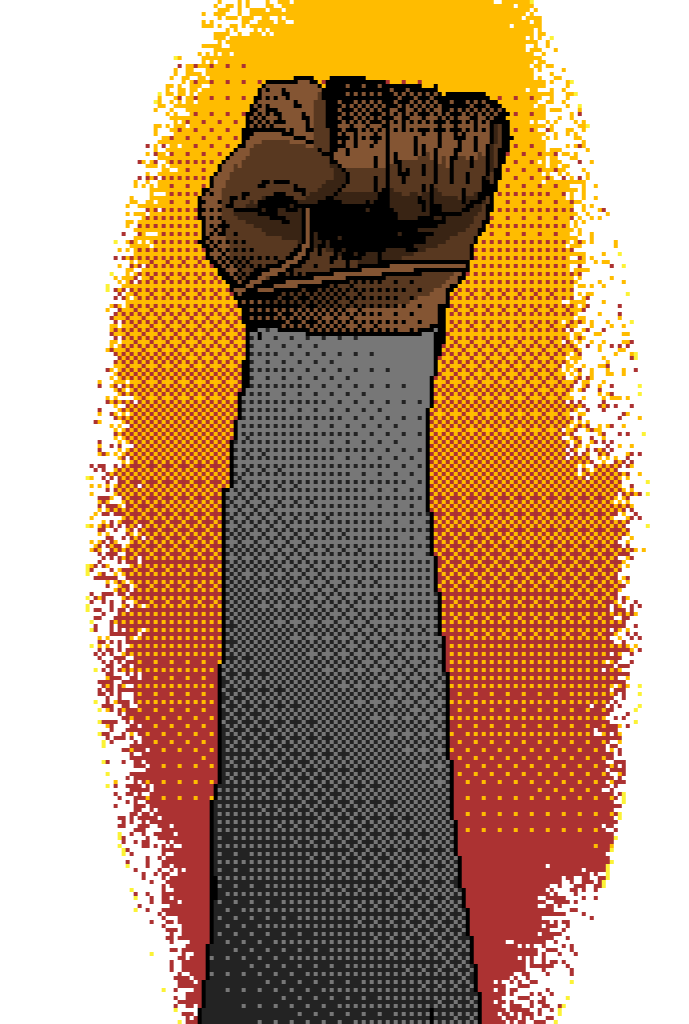
Erudition of Humanity
- Specific skills that don’t have certain effects. That is to say they don’t make the player do more damage, or have a higher defense, or heal the player. These skills are simply new moves the player learns and can apply in different sections
- The mercenary learns martial arts and skills that allow him to use different attacks and platforming techniques. None of these skills are latent, they are actionable. For instance, the overhead swing may be learned in this skill tree, it offers a powerful attack (does not change base damage output) and allows the player to hook onto a far ledge using it.
- Potential Skills:
- Overhead Swing (Jump attack)
- Deflect
- Dash-Strike
- Feign (makes the enemy react as if they’ve been attacked, can be useful for baiting enemies in for a real attack)
- Hidden slash (changes combo, adds a fourth underhanded slash that most enemies can’t deflect.)
- Wide slash (an attack with a much larger hitbox)
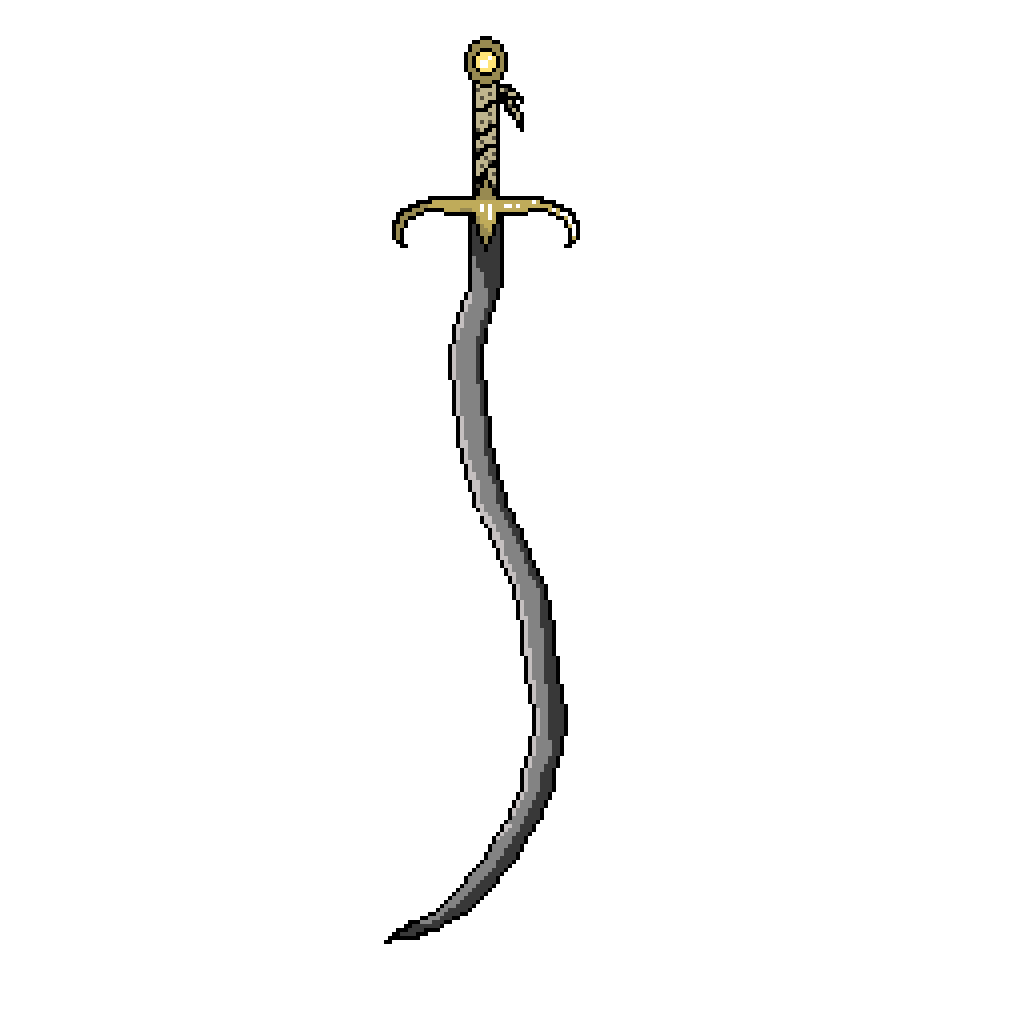
- Under this skill tree the Mercenary ascends his blade to the Sword of Knowledge just before the Ancient City levels at camp.
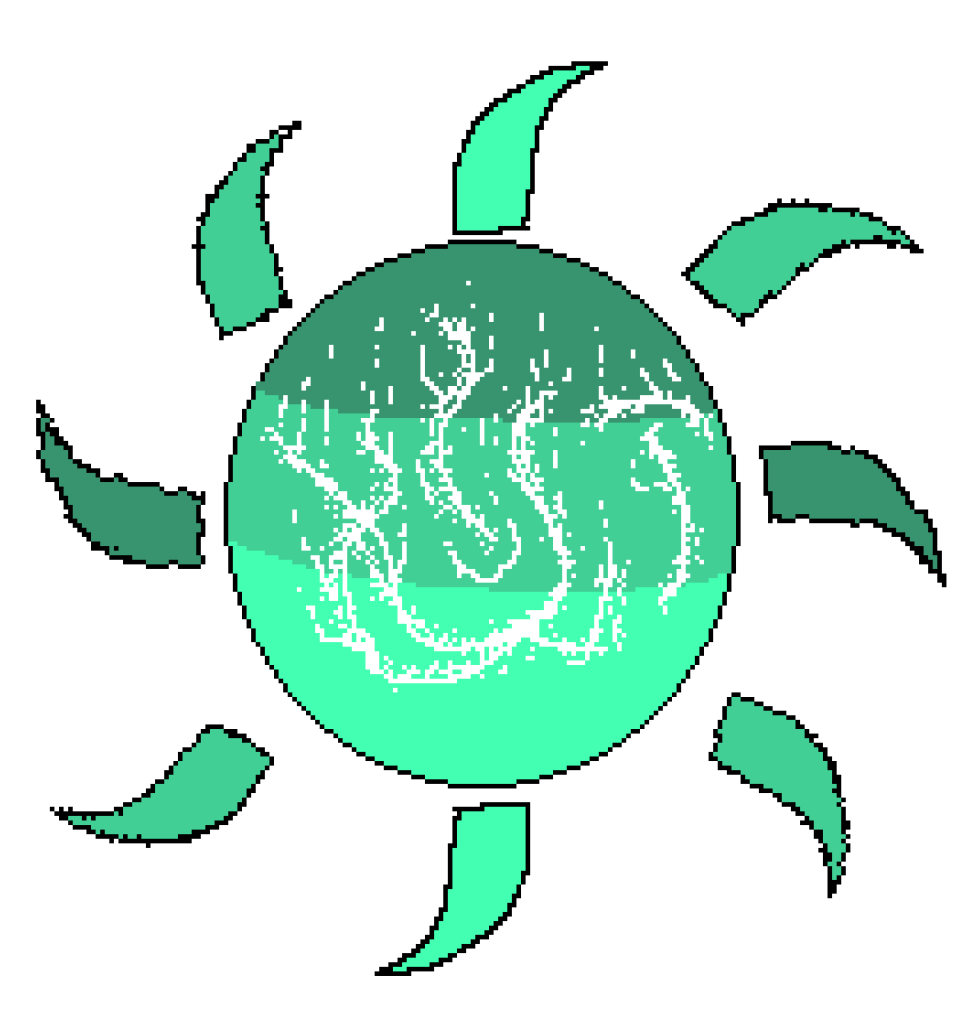
Erudition of Piety
- Specific skills that may have certain effects. They can be used for healing, increasing defense, increasing jump height, etc. These skills may be more defensive than other skill trees.
- The mercenary learns holy verses and methods of prayer. This allows him to invoke God for assistance. These invocations may give the mercenary a higher vitality or may have a task done for him. For instance, the mercenary may call upon God to help reduce his pain (i.e. increasing defense). He may also use God to strike down an enemy, essentially God carries out an action or instead of the mercenary having to risk fighting/wounding an enemy himself.
- Potential Skills:
- Healing prayer (an extra heal on top of base healing system)
- Defense prayer (increases defense)
- Speed prayer (increases movement speed)
- Clairvoyance prayer (gives a hint to how to solve a puzzle or defeat an enemy/boss; for instance, in a platforming section it can create a hologram of the mercenary to show how it would be completed)
- Dexterity prayer (increase jump height, can allow for jumping over taller enemies or skipping certain platforms)
- God strike (invokes god’s power to strike an enemy, can totally eviscerate an enemy or just deal a good chunk of damage)
- God assistance (invokes god’s power to create a temporary platform that can be used for whatever purpose, maybe making a platforming section easier or gaining distance from an enemy. Would certainly need to be play-tested).
- God cloak (uses god’s power to make you temporarily undetectable to enemies)

- Under this skill tree the Mercenary ascends his blade to the Sword of Piety at the middle point of the game at camp.
- Some of these skills can be upgraded by the Mercenary using gold.

Erudition of Magic
- Specific skills that may have certain effects. They can be used for healing, controlling enemies, increasing damage, etc. These skills may be more offensive than other skill trees.
- The mercenary learns esoteric and occult knowledge. He is able to invoke specific spirits and use magic seals/talismans. The talismans/seals may be used to garner a specific effect and the spirits may be used to enact a specific request.
- Potential Skills:
- Strength talisman (increases damage temporarily)
- Mind control spell (makes enemies hostile to each other)
- Crippling spell (makes enemies unable to fight back for a short period of time, on bosses it only restricts specific attacks)
- Healing talisman (very slowly heals the player up to 50% health when equipped)
- Violent spirit (invokes a spirit that sweeps the screen dealing damage to everything on screen in randomized percentages, albeit nothing that 1-hit kills an enemy)
- Beneficent spirit (invokes a spirit that buffs the player in one of several ways, either refills a heal, refills defenses, or refills the resource used for magic)
- Illusory spirit (invokes a spirit that generates a weaker copy of the player that assists in combat or platforming puzzles/challenges)
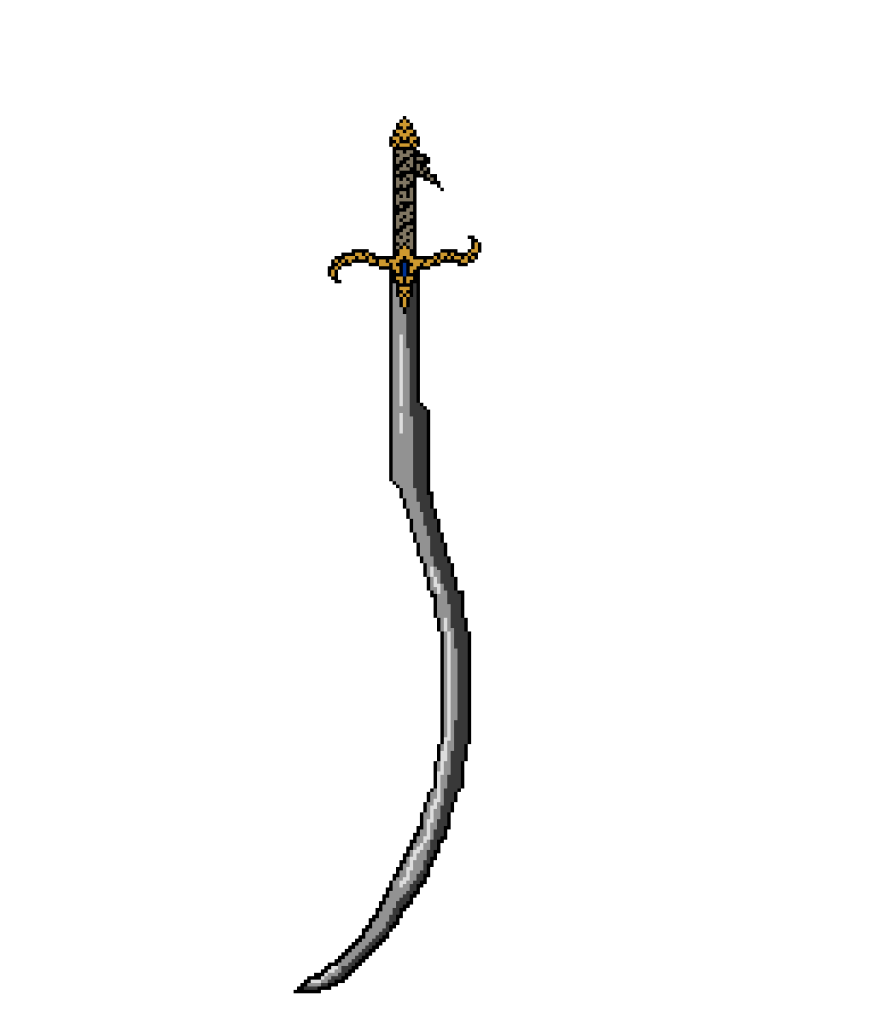
- Under this skill tree the Mercenary ascends his blade to the Sword of Magic at the middle point of the game at camp.
- Some of these skills can be upgraded by the Mercenary using gold.
Reading on real-world magic & the powers of certain religious practices can be accessed here (Note: if one takes magic/black magic seriously, one may wish to avoid this link as it contains images and text regarding the topic).
NOTE: Magic & Piety are at odds with each other. Early on in the game (between level 1 and level 2) the player will be forced to choose between both systems. Humanity is compatible with both, however it cannot be maximized unless it is prioritised over the other two eruditions; that is to say, the player may need to focus on levelling it up early on in order to have it fully upgraded.
Controller Layout:
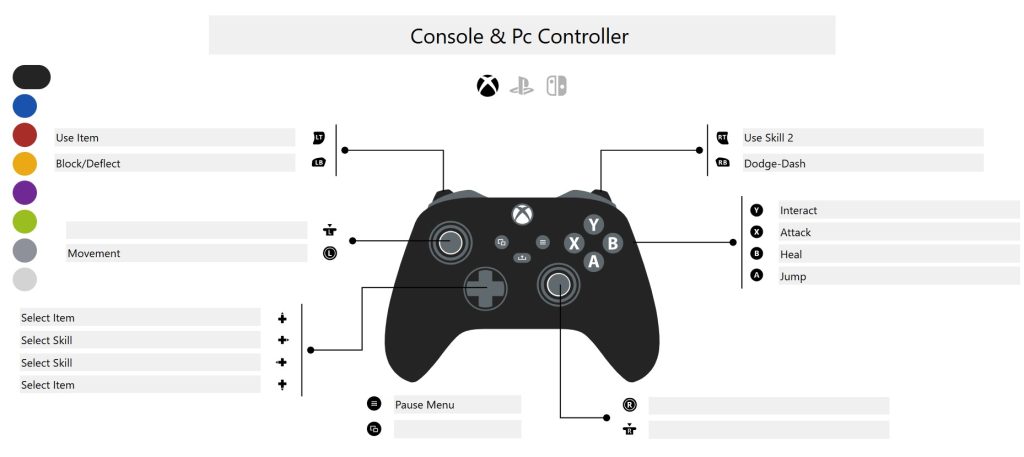
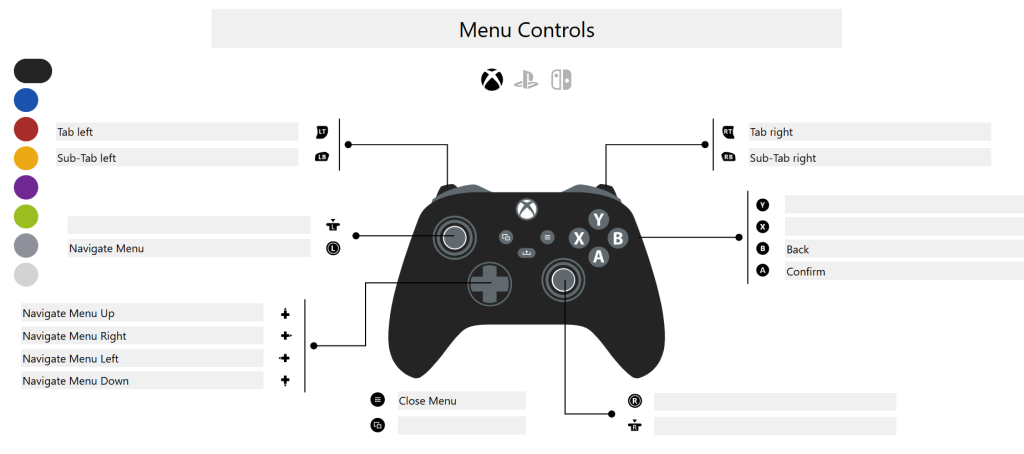
These controls would be the same regardless of console, their position on the controller remains the same, even if the names of the buttons are different between consoles. On PC the controller would work the same way too.
Upgrading Skills:
At the end of each level the player obtains a skill point that can be used on either the erudition of Magic/Piety or on the erudition of Humanity.
Skill Points:
- Magic/Piety: May be upgraded by interacting with the NPC the player allied with during the first sequence of the game. This occurs between levels when the Mercenary and his Ally make camp.
- Humanity: May be upgraded by interacting with a philosopher that periodically appears at the camp between levels or by focusing on meditating at the campfire.
Death State
- When the player dies they lose all their gold and must find the spot they died in order to recover it. The spot may be a position the player was in a few seconds before their death in order to ensure it is possible for them to recover (for instance if they fell off a cliff into a really deep chasm their gold will be found on the platform they were on before they fell off).
- All enemies respawn when a player dies. Their heals, health, and ability meter are all replenished.
- NOTE: Their defense is not replenished upon death, in order to recover defense they must either use items from merchants or specific abilities that recover it. Defense is only recovered at checkpoints and at the beginning/end of each level.
